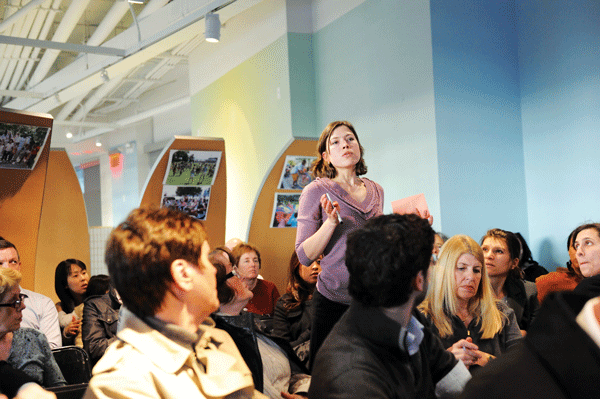 [/media-credit]
[/media-credit]
- Elena Parkhomenko, whose child has been waitlisted for kindergarten, voiced her concerns at the Battery Park City Authority’s second Town Hall meeting, which was held on March 29. B.P.C.A. president Gayle Horwitz said that the Authority can be a “bully pulpit” but doesn’t have any decision-making power to resolve the school-overcrowding problem.
BY TERESE LOEB KREUZER | B.P.C.A. holds second Town Hall meeting: On March 29, Gayle Horwitz, president of the Battery Park City Authority, conducted a second quarterly town meeting so that B.P.C. residents could ask questions and air complaints. Many people commented on the hazards of speeding bicycles. “After repeated complaints about bicyclists speeding on the esplanade, the Battery Park City Authority has engaged an engineer to investigate the possibility of installing speed bumps or another mechanism to slow things down,” Horwitz said.
She also said that the Authority has created an email address, streets@batteryparkcity.org to which residents could write “in response to the increasing number of tour buses and street safety issues that came up at the last meeting.” She said that this address could be used to send emails to the B.P.C.A. about any quality-of-life issues.
Battery Park City’s Parks Enforcement Patrol has been ticketing tour buses, Horwitz said, to keep them from idling or parking illegally on Battery Park City streets. And to help with the canine waste issue that has bothered many residents, P.E.P. launched an education and awareness campaign that will be followed up with enforcement. In addition, building managers have been apprised that they are responsible for power washing the sidewalks around their buildings.
Several parents spoke about their frustration and disappointment in having their children waitlisted for kindergarten in the neighborhood. Horwitz was sympathetic, but said the Authority doesn’t have any decision-making power over that issue. “I’m happy to advocate as best I can,” she said. She urged the parents to send her letters that she could forward to the proper agencies and to get in touch with New York State Assembly Speaker Sheldon Silver’s office, where staff members have been “very involved” in school overcrowding issues.
In answer to a number of questions, Horwitz explained why the Battery Park City Community Center is still unfinished. “For anyone who has had a kitchen or a bathroom done, there always seems to be something else,” she said. “In our case it had to do with the City of New York and the permits we needed for our boiler inspection which then allowed us to contact Con Ed to get a gas meter. The reason a boiler and a gas meter are important is so that you can have heat in the building. We have continued construction throughout the winter without heat.”
She said that the Community Center is “unique” because it is a green building and also a building within a building. “Every time the Department of Buildings would look at our boiler application, they would look at the boiler for the base building – high rises 23 and 24 — and they kept mixing up whose boiler they were looking at. Four different departments of the Department of Buildings have to sign off and so this all had to be explained over and over and over again. We just recently had our boiler inspection and the boiler was approved, which then means that you have to battle Con Ed to get your actual gas meter.”
Horwitz said that the Authority has been working on everything in the Community Center that didn’t require heat. “But,” she continued, “in order to lay the gym floor down, the wood has to acclimate in a conditioned environment. The temperatures have to be the appropriate temperature so that the wood can expand appropriately and you don’t have buckling. You get one shot to get it right and we want to be sure that we get it right the first time.”
“Can you personally commit that Asphalt Green will be open for summer camp in June?” a parent asked. Horwitz replied, “I think it would be very irresponsible for me to make a promise about summer camp. I would hate for somebody to promise me something and something doesn’t happen. I anticipate it will be open for summer camp, but I can’t promise that.”
Downtown seniors’ chorus: The Church Street School for Music and Art has a grant from Manhattan Borough President Scott Stringer and City Council Member Margaret Chin to start a second Downtown Seniors’ Chorus in Battery Park City and is inviting seniors to sign up. Church Street already runs a chorus at the Hallmark residence for seniors on North End Avenue and a chorus at Southbridge Towers in the Seaport.
Rehearsals and performances for the newly formed chorus would take place at the Community Center on North End Avenue. “We were hoping to start the first week in May,” said Betsy Kerlin, director of programming and development for Church Street. But since the Community Center is unfinished, that date is uncertain.
Kerlin said that the music to be rehearsed and performed would depend on the interests of the participants. The seniors in the other choruses “have a lot of fun,” she said. “The music they sing reminds them of times in the past, and it builds community.”
No singing experience is required to participate. For more information, call the Church Street School at (212) 571-7290 or email info@churchstreetschool.org.
[media-credit id=1 align=”aligncenter” width=”600″] [/media-credit]Battery Park City in bloom: “There’s so much to look at in the gardens right now,” said Eileen Calvanese, horticultural foreperson for the Battery Park City Parks Conservancy. “The crazy weather has got everything going at once!”
[/media-credit]Battery Park City in bloom: “There’s so much to look at in the gardens right now,” said Eileen Calvanese, horticultural foreperson for the Battery Park City Parks Conservancy. “The crazy weather has got everything going at once!”
Among the eye-catching blooms are carpets of diminutive, blue-violet grape hyacinths, whose botanical name is “Muscari,” referring to their musk-like odor. A lovely spread of them is growing on Rector Place near the esplanade.
This particular species is “Muscari armeniacum.” It originated in the eastern Mediterranean, growing wild in Greece and Turkey and in the Caucasus. It was first introduced to European gardens in 1871. There are around 40 species of Muscari. Examples of species other than “Muscari armeniacum” are growing on the esplanade.
To comment on Battery Park City Beat or to suggest article ideas, email TereseLoeb@mac.com






























